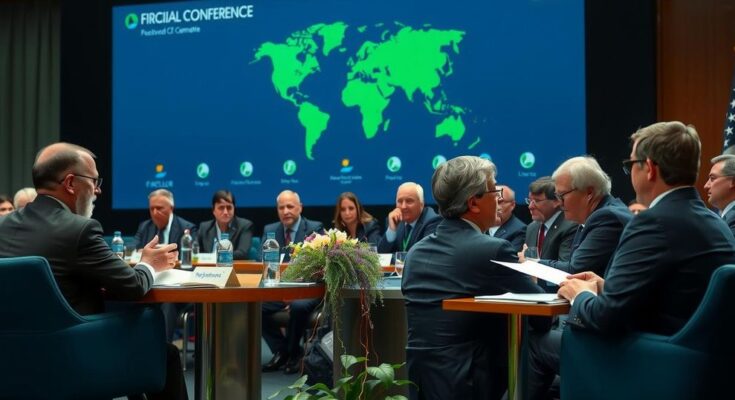At COP29 in Baku, developed nations pledged $300 billion annually for climate funding, aiming to raise this to $1.3 trillion by 2035. However, this commitment faced criticism from developing countries for being inadequate. U.N. officials stressed the urgency for greater efforts, especially with rising global temperatures ahead of COP30.
At the recent U.N. Climate Change Conference (COP29) held in Baku, developed nations announced their commitment to allocate $300 billion annually for climate change initiatives, intending to raise this amount to $1.3 trillion by the year 2035. However, this pledge has drawn significant criticism from developing countries, which deem the funding as insufficient to address the profound challenges posed by climate change.
U.N. Secretary-General Antonio Guterres acknowledged the pledge but highlighted that it does not meet the necessary ambition to tackle the climate crisis adequately. He emphasized that the proposed annual funding of $300 billion is inadequate considering the scale of the challenges that lie ahead. Similarly, UNFCCC Executive Secretary Simon Stiell expressed concerns, stressing the urgency for countries to double their efforts ahead of the upcoming COP30 conference in order to fulfill climate commitments.
Delegates from developing nations have voiced their disapproval of the agreement. India’s representative at COP29, Chandni Raina, characterized the outcome as an “optical illusion,” arguing that it fails to effectively respond to the magnitude of the climate challenges they face. Tina Stege, representing the Marshall Islands, also criticized the funding as lacking, asserting that it leaves vulnerable nations with a mere fraction of the necessary resources. Officials from African nations echoed these sentiments, with Sierra Leone’s delegate accusing developed nations of exhibiting a “lack of goodwill.”
This agreement underscores the persistent tensions in climate financing, as vulnerable nations emphasize that they disproportionately suffer the impacts of climate change while wealthier countries do not provide adequate support. The announcement coincided with warnings from the EU’s climate observation platform, Copernicus, that 2024 is poised to be recorded as the hottest year on record. Current global temperature averages for the first ten months of 2024 were reported at 0.71°C above the 1991-2020 average, highlighting the urgency for effective climate action.
As the next COP30 approaches, expectations will likely rise for developed nations to honor their financial commitments and adopt a more equitable stance towards climate financing. Developing countries continue to call upon major greenhouse gas emitters, including the United States, Canada, China, and Gulf states, to increase their contributions in combating climate change.
The COP29 conference serves as a critical platform for nations to negotiate and pledge financial resources to fight climate change, a pressing global issue exacerbated by rising temperatures and extreme weather patterns. Historically, developed nations have faced scrutiny over their financial obligations towards less wealthy countries, which are significantly impacted by climate fluctuations despite having contributed less to the problem. As global temperatures continue their upward trend, the need for substantial financing for adaptation and mitigation efforts in vulnerable areas becomes increasingly urgent.
In summary, while developed nations have pledged $300 billion annually towards climate change initiatives, criticism from developing countries emphasizes that this funding is insufficient. High-ranking U.N. officials have recognized the limitations of this agreement, and delegates from vulnerable nations have expressed their concerns regarding financial commitments. The upcoming COP30 conference will be pivotal in determining whether developed countries will enhance their support for climate action.
Original Source: www.turkiyetoday.com




